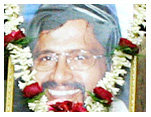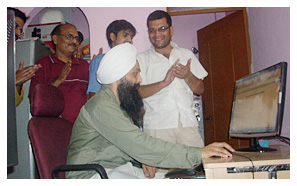 Khwaja Ahmad Abbas was one of the first journalists in India who was also closely associated with the art of film-making in more than one respect. He was a screenwriter as also director of some very important Hindi films. Other than being the screenwriter for some of the best Raj Kapoor films like Awaara, Shri 420, Mera Naam Joker and Bobby , he is also credited for having introduced the Big B to the Indian screen through his almost forgotten Saat Hindustani.
Khwaja Ahmad Abbas was one of the first journalists in India who was also closely associated with the art of film-making in more than one respect. He was a screenwriter as also director of some very important Hindi films. Other than being the screenwriter for some of the best Raj Kapoor films like Awaara, Shri 420, Mera Naam Joker and Bobby , he is also credited for having introduced the Big B to the Indian screen through his almost forgotten Saat Hindustani.
His column ‘Last Page’ (‘Azad Kalam’ in the Urdu edition), holds the distinction of being the longest-running column in the history of Indian journalism. The column began in 1935, at Bombay Chronicle, and when it closed, it moved to the Blitz, where it continued till his death in 1987. He was also one of the first journalists in India to be awarded the Padma Shri in 1969.
Abbas began his career as a journalist, when he joined ‘National Call’, a New Delhi based paper after his finishing his B.A in the early 1930s. He is also responsible for having started ‘Aligarh Opinion’, India’s first university students’ weekly, while still studying law in 1934.
After completing his education, Abbas joined the Bombay Chronicle in 1935. He occasionally served a film critic, but after the film critic of the paper died, he was made the editor of the film section. In 1946, he wrote screenplay, for Neecha Nagar, which became the first Indian film to win a foreign award in the shape of Golden Palm at the Cannes Film festival.
As early as 1939, he wrote a widely read book “Outside India: The Adventures of a Roving Reporter” carrying his experiences as a reporter. Much later, his celebrated autobiography “I Am not an Island: An Experiment in Autobiography” came in 1977. He wrote many other books including those on Jawahar Lal Nehru and Indira Gandhi, some of which were extremely critical of the prevailing system.
Many books have been written on K A Abbas as well. They include – Ethos of Khwaja Ahmad Abbas, novelist, film-maker, and journalist: A study in social realism, by Hemendra Singh Chandalia and one by Raj Narain Raz called Khawaja Ahmed Abbas-Ifkar. Some important article on this great journalist include Dr. R.G. Mathapati’;s Abbas an Island, S Ghish’s., K A Abbas: A Man in Tune with History in Screen, an obituary in Jump Cut (Berkeley, California), and that by another celebrated film critic V. P. Sathe called “K.A. Abbas, The Crusader” in Filmfare.
It is said about Abbas that-“Just as journalism affected Abbas’s literary career both his literary and journalistic career affected Abbas’s film activities. The line of demarcation between the two is very thin. For, it will not make any difference to his purpose and approach to art, whether he wrote a column, a novel or made a film.”
Why I am remembering him here is not only to pay tributes to one of the earliest and hugely respected journalist of India but also to present the fact that Naya Sansar (New World in English), written by Abbas was possibly also the first Indian film which had a journalist in the lead role. Thus one can say that Khwaja Ahmad Abbas can be credited to have brought journalism and journalist into Hindi films, which was alter on seen in so many films and the trend is seen till date,. This is a 1941 Hindi film on radical journalism. Interestingly while the film was written by Abbas, it was directed by another reporter turned director, N.R. Acharya. Abbas started his film career with this film.
It is said that Abbas had no intention of making films but it was his two years career as a film critic for ‘Bombay Chronicle’ that dragged him here. Abbas could bear anything but not a challenge or challenges. In response to Abbas’s criticism on inconsequential and shoddy film stories of the time in one of his columns, a producer challenged him saying, “It’s easy to criticise, but let us see you writing a film story”. The story goes that Abbas accepted the challenge and wrote a film script based on his experiences in the journalistic field as a reporter.
It was this story that later came to be filmed as Naya Sansar.
The film was commercially as well as artistically a great success. It won him the Bengal Film Journalists Award for the best story and screen-play. And it also celebrated silver jubilees in most cities and started a wave of ‘Naya’ and ‘Nai’ films which are still going on. Even during those days, Abbas was paid seven hundred and fifty rupees for this film script by Shshidhar Mukharjee, the producer of the film.
The film starred Renuka Devi and Ashok Kumar in lead roles. It used Abbas’s journalistic background to create a story about the new rising radicalism in Indian society and journalism, through a conflict between a dynamic young reporter and his cautious yet idealistic editor of a progressive newspaper ‘Sansar’, Premchand (Mubarak), who falls in love with a beautiful orphan Asha (Renuka Devi), whom his family has raised from an infant.
Soon Asha starts working for the newspaper and falls in love with Sansar’s star reporter and radical journalist, Puran (Ashok Kumar), while still feeling indebted to Premchand’s family.
Some conflicts start taking place between Premchand and Puran, leading to Puran quitting Sansar and starting his own newspaper, Naya Sansar.
But unlike what happens today, in the film Premchand quickly realizes his errors and not only reverts back to the paper’s previous left-wing stance, but also allows Asha and Puran to marry.
Carol J. Slingo while paying K.A. Abbas a tribute at the time of his death rightly said- “Khwaja Ahmed Abbas died on June 1, 1987 after 41 years as the most prominent voice of the left in Indian commercial films. While other political filmmakers addressed their work to educated viewers, he spent his life trying to reach the mass, more or less uneducated, audience of millions.”
So, here we have the first film on journalists and journalism by one of the most important journalists of India.
Amitabh Thakur, IPS officer of UP Cadre, presently on Study leave at IIM Lucknow.















Pradeep kapoor
December 2, 2010 at 1:44 pm
I enjoyed reading this article. It is also very informative especially for present genration which has almost t forgotton pesons like Abbas who was legend in his life time. I knew Abbas since my childhood as he very close friend of my father late Bishan kapoor. I remember way back in 1968 he arranged for us to see the shooting of Mera Naam Joker in Mumbai. Since i was also in BLITZ so during my visit to Mumbai those days i used to spend time with Abbas at his residence.